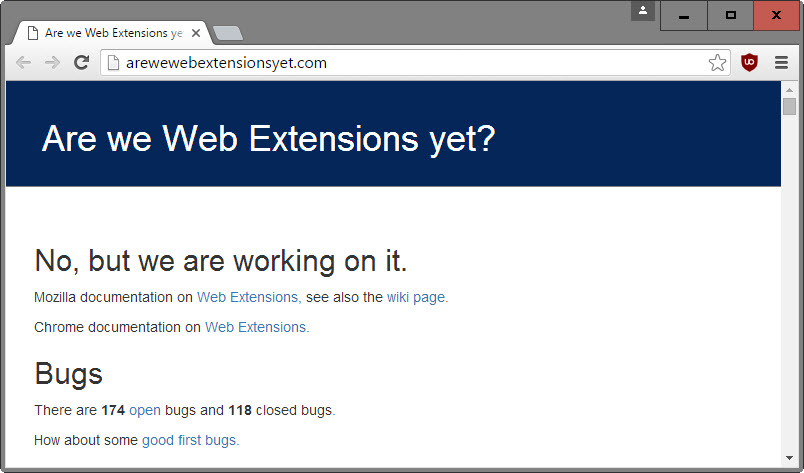Firefox WebExtensions: Mozilla aims for Firefox 48
Mozilla, maker of the popular Firefox web browser, aims to integrate the first stable release of WebExtensions in Firefox 48.
The organization announced back in August 2015 that it would make fundamental changes to the add-on development process in Firefox. At the core of the change is a focus on WebExtensions, a new API Mozilla is working on to make it easier for developers to create cross-platform extensions, and to reduce the time it takes to review extensions before they are published on Mozilla's official add-on repository.
The announcement did not sit well with some members of the Firefox community. Some developers announced that they would stop developing their add-ons for Firefox, while some community members expressed the desire to move to another browser if Mozilla would implement WebExtensions.
A core reason for the reaction is Mozilla's intention to deprecate Firefox's permissive add-on model and with it XUL and XPCOM which allowed add-ons to be created that are not possible in other browsers due to development limitations.
Critics fear that Firefox add-ons would not be nearly as powerful as before after the switch, that there would be little reason to use Firefox if popular add-ons would not be possible anymore under the new add-on development model, and that the creation of out of the box add-ons would be severely hindered.
Firefox WebExtensions

A recent blog post by Mozilla's Engineering Manager Andy McKay provides insight into the current state of WebExtensions development and milestones.
WebExtensions are in alpha state currently and Mozilla plans to reach the first project major milestone with the release of Firefox 45 in March 2016.
The developers plan to integrate full or partial support for a number of APIs with the release:
With the release of Firefox 45 in March 2016, we’ll have full support for the following APIs: alarms, contextMenus, pageAction and browserAction. Plus a bunch of partially supported APIs: bookmarks, cookies, extension, i18n, notifications, runtime, storage, tabs, webNavigation, webRequest, windows.
Developers may be able to upload webExtensions add-ons to Mozilla's AMO website as early as Firefox 44.
The organization plans to release a WebExtensions beta in Firefox 47 (May 31, 2016), and a first stable release of the API set in Firefox 48 (July, 12, 2016).
Mozilla has created several resources to assist developers in the creation of WebExtensions:
Firefox WebExtensions Resources
- Are We WebExtensions Yet reveals the state of development. It lists APIs, bugs and key tracking bugs similar to how Are We e10s Yet highlights the Electrolysis progress.
- Core Tracking Bugs: First release, Google Chrome parity, Reddit Enhancement Suite, NoScript.
- Chrome incompatibilities.
- Mozilla WebExtensions documentation.
- WebExtensions examples.
These goals may change depending on the progress that Mozilla makes, tests, and other parameters that may delay the release of WebExtensions.
If things stand as they are, Firefox users may be able to install first WebExtensions add-ons as early as March 2016.